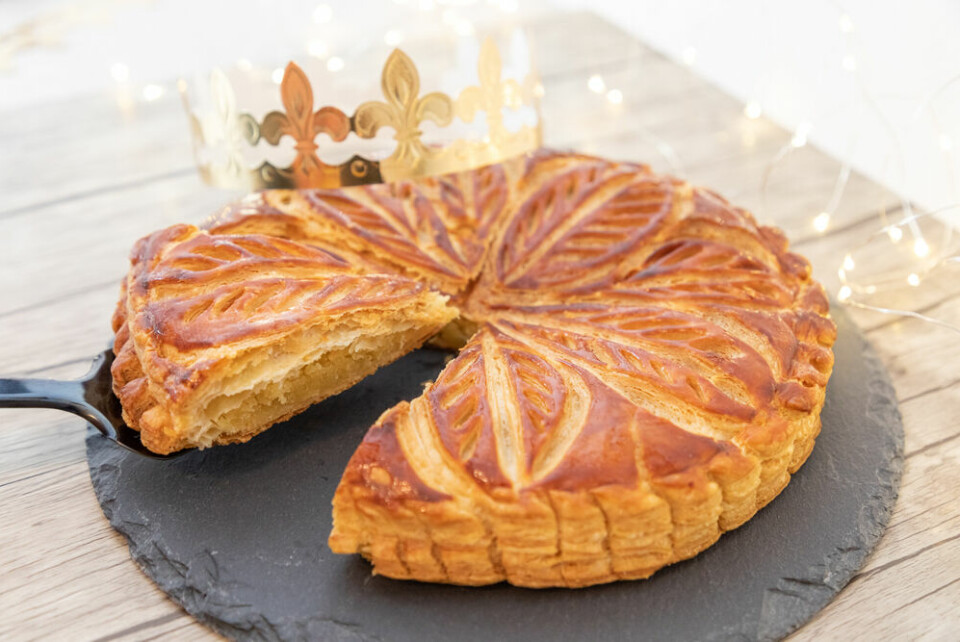RECIPE: How to make a perfect French galette des rois
To celebrate Epiphany, people across France enjoy a traditional, sweet treat: the galette des rois. We share a simple recipe to make your own
Caption: The lucky finder of the fève gets to be king for the day according to French tradition
AB Photographie / Shutterstock
Epiphany marks the arrival of the Three Kings bearing gifts for baby Jesus. In France, this is often celebrated on January 6 with families and friends gathering to indulge in a galette des rois, the kings’ cake.
When eating a galette des rois, tradition dictates that the youngest person present goes under the table and shouts out names as the cake is cut and slices are handed out according to the shouts.
The cake contains a little trinket (the fève). The fève was originally a bean but it has evolved over time and is now often a coin or a little figurine. Whoever finds the fève in their slice is then king for the day and wears a paper crown supplied with bought cakes. Everyone is meant to honour the ‘king’s’ wishes for the rest of the day.
Link to Roman times
The tradition dates to Roman times when slaves and their owners would eat together for Saturnalia, the Roman celebration of the winter solstice. Slaves could swap roles with their masters for a day if they found the fève.
The tradition can also be traced back to the Catholic religion. In this case, Epiphany is celebrated on the first Sunday of the month, so that religious people can celebrate at Sunday mass.
Epiphany marks the coming of the Three Kings or Wise Men and welcoming the Baby Jesus and bearing gifts for him. In English, Epiphany is also referred to as the Twelfth Night as it is the twelfth night after Christmas.
The reason that the French choose to eat galette des rois on Epiphany seems to be a combination of both of these traditions.
In practice, galettes are eaten throughout the end of December and all of January, particularly the first two weeks, but are not sold the rest of the year.
Importance of the galette des rois in French society
Each year, between 20 and 30 million galette des rois are sold. For individual bakeries, this can represent up to 10% of their annual revenue.
Around 96% of French people intended to eat at least one galette that year, a survey found in December 2020.
There is even a ceremony held every year at the Elysée, the French president’s official residence, with a galette made by some of the best bakers in France. This ceremony was started by former president Valéry Giscard d'Estaing in 1975.
There is no fève or crown with the presidential galette because France is a republic and the president should not wear a crown.
The traditional Galette des Rois recipe
Different regions of France make different versions of this cake. For example, parts of southern France make a Gâteau des rois, which is a cake or brioche garnished with sugar crystals or candied fruit.
The most traditional and most popular version is made of puff pastry and almond cream or marzipan. You can make it with your own homemade puff pastry but below is a simple recipe with shop-bought puff pastry, taken from the A Table !!! YouTube channel.
For 6-8 people
Ingredients:
- 2 puff pastries
- 100g of ground almonds
- 100g of butter
- 100g of sugar
- 2 eggs
- 1 egg and 1 egg yolk to give a golden-brown colour
- 1 fève
Leave the butter in a bowl for an hour at room temperature then whisk. Add the sugar and whisk more before adding the two eggs. Whisk until it is a thick, liquid consistency.
Then, add your ground almonds and continue whisking until you have the desired consistency, which should be smooth and spreadable. Your almond cream is ready. If you want, you can then mix in Creme Patissiere to make frangipane.
Set out one of your puff pastries and spread the almond cream over it, leaving 2 centimetres on the sides. Place your fève and cover with the second puff pastry. Press down with your fingers on the edges so the pastries stick together.
Beat your egg and egg yolk. With a knife, make little slits from the edge of the pastry towards the inside. With a brush, apply the egg to the pastry and then let it rest in the fridge for half an hour.
Preheat the oven to 180 degrees. Apply a second coating of egg. Decorate your galette however you like with a knife: you can make a square or diamond pattern for example.
Prick the dough near the edges. Put in the oven for 20 minutes, then bring the temperature down to 150 degrees and cook for a further 20 minutes.
Voilà! You should have a beautifully decorated, golden-brown galette des rois. Remember to also have a crown for the lucky finder of the fève.
If you want, you can make your own puff pastry, although this can be quite time-consuming.
Below is a different recipe in English using praline and almond cream.





























